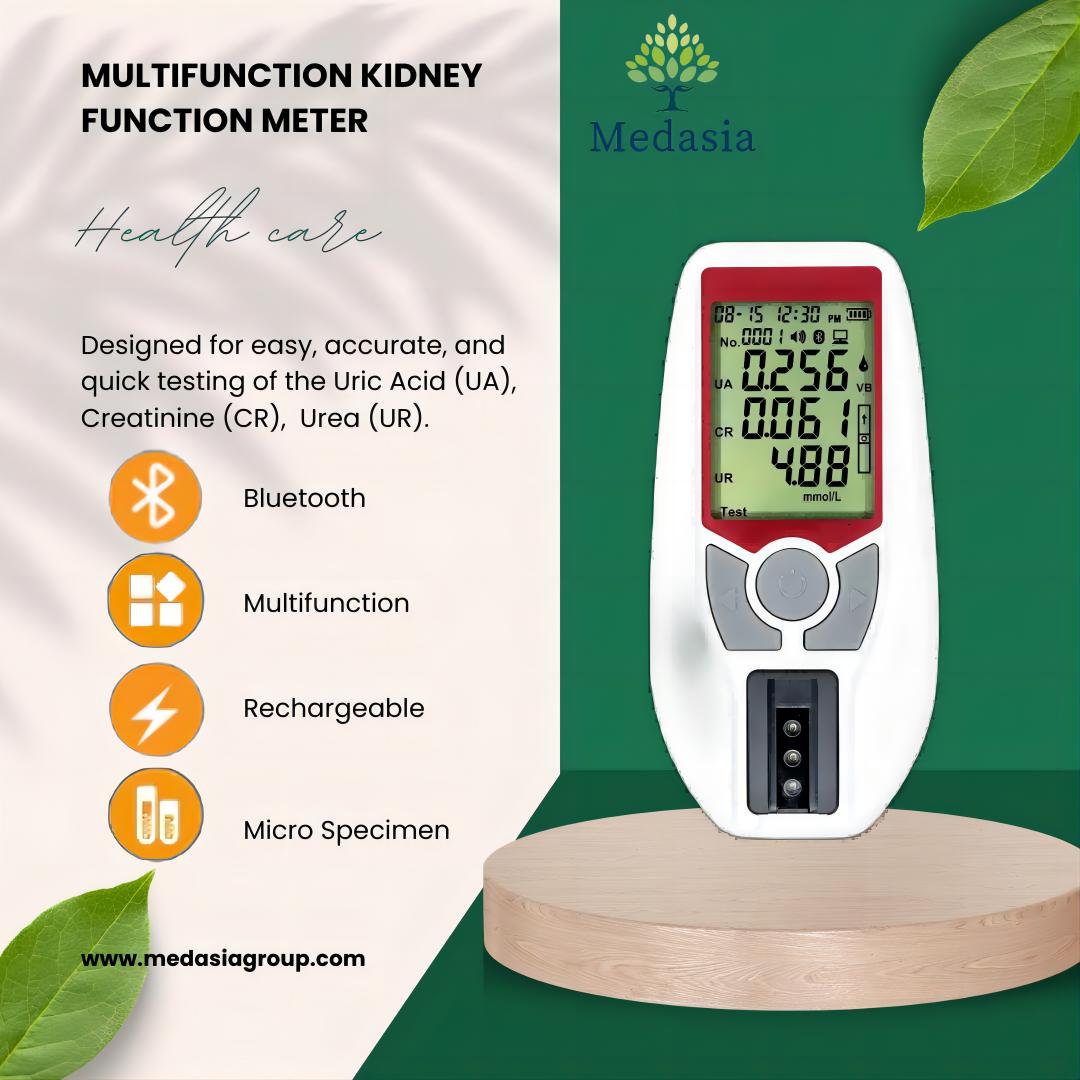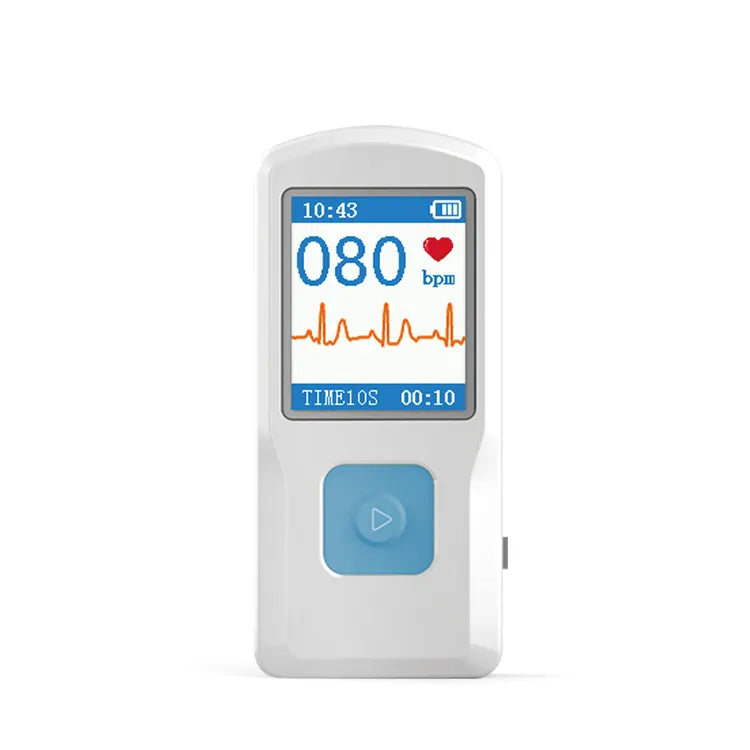Keeping Tabs on Your Kidneys: The Importance of Using a Renal Function Meter

The importance of monitoring kidney function
Discovering the significance of maintaining optimal kidney health is crucial for overall well-being. And now, keeping tabs on your kidneys has never been easier with the introduction of the Renal Function Meter. This innovative device allows individuals to monitor and assess their renal function in the comfort of their own homes.
By regularly measuring key kidney health indicators like creatinine levels, glomerular filtration rate (GFR), and urine albumin, the Renal Function Meter empowers users to take control of their kidney health. With this information at their fingertips, they can proactively detect any potential issues early on and make necessary lifestyle adjustments or seek medical intervention promptly.
Using state-of-the-art technology, the Renal Function Meter delivers accurate and reliable results in just a few simple steps. Its user-friendly interface and intuitive design make it accessible to individuals of all ages. Whether you have a pre-existing kidney condition or simply want to safeguard your renal health, the Renal Function Meter is a valuable tool for monitoring kidney function and staying informed about your overall health.
With its convenient and effective monitoring capabilities, the Renal Function Meter provides peace of mind and empowers individuals to take charge of their kidney health journey. Don't wait until it's too late – start using a Renal Function Meter today to stay proactive about your kidney health.
Common kidney problems and their impact on overall health
Proper kidney function is vital for maintaining overall health and well-being. The kidneys play a crucial role in filtering waste products, regulating fluid balance, and producing important hormones. When the kidneys are not functioning optimally, it can lead to a range of health problems, including high blood pressure, electrolyte imbalances, and even kidney failure. Regular monitoring of kidney function can help identify any potential issues early on, allowing for timely intervention and appropriate management.
Kidney problems can arise due to various factors, such as underlying medical conditions, genetic predisposition, or lifestyle factors. Certain medical conditions, such as diabetes and hypertension, can significantly impact kidney function and increase the risk of developing kidney disease. By monitoring kidney function regularly, individuals with these conditions can take proactive steps to manage their health effectively and prevent further complications.
How renal function meters work
Chronic kidney disease (CKD) is a prevalent condition that affects millions of people worldwide. It is characterized by a gradual loss of kidney function over time. Without proper management, CKD can progress to end-stage renal disease (ESRD), where the kidneys can no longer perform their essential functions adequately. ESRD requires dialysis or kidney transplantation for survival.
In addition to CKD, other kidney problems can arise, such as kidney stones, urinary tract infections, and polycystic kidney disease. These conditions can cause discomfort, pain, and may lead to complications if left untreated. Monitoring kidney function can help detect any abnormalities early on, allowing for appropriate treatment and prevention of further complications.
Benefits of using a renal function meter

Renal function meters utilize advanced technology to measure key indicators of kidney health quickly and accurately. These devices typically rely on blood and urine samples to assess kidney function. The most common tests performed by renal function meters include measuring creatinine levels, calculating glomerular filtration rate (GFR), and detecting urine albumin.
Creatinine is a waste product that is produced by the muscles and excreted by the kidneys. Elevated creatinine levels in the blood can indicate impaired kidney function. Renal function meters can measure creatinine levels using a small blood sample, providing valuable insights into kidney health.
GFR is a measure of how well the kidneys are filtering waste from the blood. A decrease in GFR can be an early sign of kidney dysfunction. Renal function meters use algorithms to calculate GFR based on creatinine levels, age, gender, and other factors, providing an estimate of kidney function.
Urine albumin testing is another important parameter to assess kidney health. Increased levels of albumin in the urine can indicate kidney damage. Renal function meters can detect urine albumin using urine samples, enabling users to monitor kidney health at home conveniently.
Factors to consider when choosing a renal function meter
Using a renal function meter offers several benefits for individuals concerned about their kidney health. Some of the key advantages include:
- Convenience: Renal function meters allow individuals to monitor their kidney health from the comfort of their own homes. This eliminates the need for frequent visits to the doctor's office or laboratory, saving both time and money.
- Early Detection: By regularly monitoring kidney function, potential issues can be detected early on. This early detection allows for timely intervention and appropriate management to prevent further damage to the kidneys.
- Empowerment: Renal function meters provide individuals with valuable information about their kidney health, empowering them to make informed decisions about their lifestyle, diet, and overall well-being. With this knowledge, individuals can take proactive steps to protect their kidneys and maintain optimal health.
- Cost-Effective: Investing in a renal function meter can be a cost-effective alternative to frequent laboratory tests. The initial cost of the device may be higher than individual tests, but in the long run, it can save money by reducing the need for expensive laboratory visits.
Tips for accurate readings with a renal function meter
When selecting a renal function meter, it is essential to consider several factors to ensure you choose the right device for your needs. Some key factors to consider include:
- Accuracy: Look for a renal function meter that provides accurate and reliable results. Read reviews and compare different models to determine which device offers the highest level of accuracy.
- Ease of Use: Opt for a renal function meter with a user-friendly interface and intuitive design. The device should be easy to operate, even for individuals who are not technologically inclined.
- Compatibility: Check if the renal function meter is compatible with your smartphone or other devices. Some devices offer Bluetooth connectivity, allowing you to sync your results and track your kidney health over time.
- Customer Support: Consider the availability of customer support and after-sales service. A reputable manufacturer should provide adequate customer support to address any issues or concerns that may arise.
Comparison of popular renal function meters on the market
To ensure accurate readings with a renal function meter, it is important to follow these tips:
- Read the Instructions: Familiarize yourself with the user manual and follow the instructions provided by the manufacturer. Each device may have specific guidelines for sample collection and testing.
- Use Proper Technique: Follow proper hygiene practices when collecting blood or urine samples. Ensure the sample collection area is clean and sterile to prevent contamination.
- Be Consistent: Perform the tests at the same time each day to ensure consistent results. This consistency allows for better monitoring of changes in kidney function over time.
- Keep a Record: Maintain a record of your results to track changes in kidney function. This record can provide valuable information to healthcare professionals if you need to seek medical advice.
Where to buy renal function meters and their cost
When choosing a renal function meter, it can be helpful to compare different models to find the one that best suits your needs. Here is a brief comparison of some popular renal function meters available on the market:
- Brand A: Offers a compact design and provides accurate results in just a few minutes. It has a user-friendly interface and Bluetooth connectivity for easy data tracking.
- Brand B: Features a larger display screen for easy reading of results. It has an extensive memory capacity to store past readings and offers customizable reminders for testing.
- Brand C: Provides a comprehensive analysis of kidney function, including additional parameters like urine pH and specific gravity. It offers a mobile app for seamless data management and tracking.
Conclusion: Taking control of your kidney health with a renal function meter
Renal function meters are available for purchase from various sources, including online retailers, medical supply stores, and pharmacies. Prices can vary depending on the brand, model, and additional features offered by the device.
Explore More Blogs
The Promising of Cholesterol Testing
What Advantages Of A Portable Mesh Nebulizer?
Hemoglobin Meter: Let's help people to monitor anemia
How to choose a better digital thermometer
Digital Pregnancy Test : Assisting Couples in Conceiving
Portable Fetal Doppler: Bonding with Your Baby
Reference
Chronic kidney disease Page last reviewed: 22 March 2023
WE RECOMMEND
Related posts
- Subscribe MedInsights
- Subscribe MedInsights
- Subscribe MedInsights
- Subscribe MedInsights
- Subscribe MedInsights










